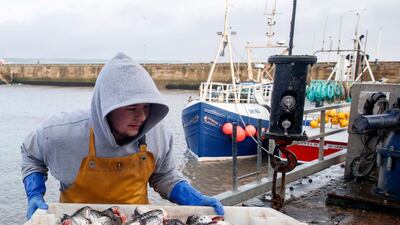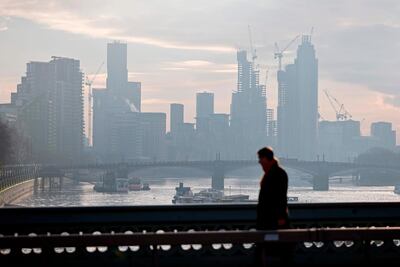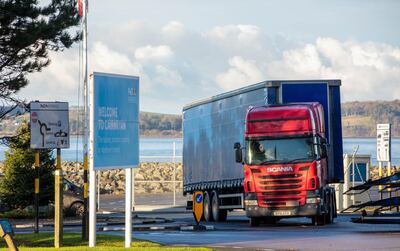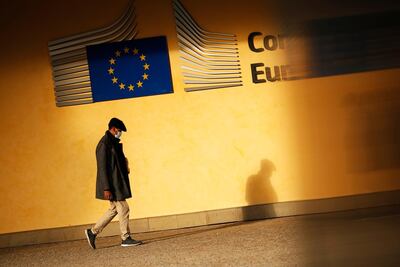British Prime Minister Boris Johnson says the UK and EU are still a long way apart and a Brexit deal may not be reached in time.
That is despite the two sides reaching an agreement over trade in Northern Ireland that comes into force at the end of the transition period on December 31.
But the issue of a wider trade deal is still up in the air as both sides strongly disagree over key issues.
Less than a month remains until 'no deal' kicks in by default, but agreement needs to be reached before then so there is enough time to ratify any deal.
The three main sticking points are:
- Both sides are concerned over who is allowed to fish in UK fishing waters
- The EU is worried the UK will give financial help to its own firms and has called for a level-playing field
- There is disagreement over how any agreement will be enforced
Why do they disagree? What happens if a deal is not signed? All the key questions are answered here:
What are the main issues blocking a deal?
Fishing
EU fishermen have long had access to Britain's rich fishing waters - in some cases for centuries - and negotiators initially promised a quick deal to appease European fleets.
But inflexibility on both sides of the Channel made it impossible to reconcile two starting positions: demands for the status quo of full access to UK waters by the European side, and total control of access by London.
The fishing industry represents only a tiny part of both economies. Europeans each year catch fish worth €635 million ($738 million) from UK waters and Britain €110 million from EU waters.
But the subject is explosive for a handful of member states with politically influential fishing fleets - France, Spain, Belgium, the Netherlands, Denmark and Ireland - and hugely symbolic for pro-Brexit Britons.
The EU's negotiator, Michel Barnier, is trying to get the UK to accept a long-term arrangement in which EU access is cut by just 18 per cent. The UK is asking for European access to be slashed by 80 per cent.
Level-playing field
Britain wants a trade deal that would bring zero tariffs and zero quotas to cross-Channel business. While Europeans are keen, they fear that this could allow the UK to become an offshore rival that makes its fortune with a deregulated economy that competes unfairly with EU businesses.
For example, would UK exporters be allowed to pollute more when producers on the continent would have to meet strict environmental standards, at a time when the fight against climate change is a big deal in Brussels?
On the environment, as well as on labour law and tax, Brussels wants London to commit to maintaining existing standards - something called a "non-regression" clause - and that these standards should evolve over time in step with EU legislation.
On state aid, the EU fears that the UK might subsidise its businesses and economy, giving its companies an unfair advantage, when EU rules are very strict.
Brussels is calling for both sides to agree on shared principles governing state aid and wants London to establish an independent authority that would maintain policy links with Brussels.
Enforcement
The EU also wants EU businesses to be able to argue their case in UK courts and that in case of unfair regulations, Brussels could take rapid tariff-measures.
In eight months of negotiations, London and Brussels have still not been able to agree on the "governance" of the future agreement, meaning the conditions for its implementation, its monitoring, and the mechanisms to settle any disputes.
This became of paramount importance to Europeans after the government of Boris Johnson introduced a bill in the UK parliament that would reverse certain parts of the already concluded Withdrawal Agreement, which governs Britain's departure from the European Union on January 31 this year.
The about-face undermined Brussels' trust in London. The idea is to set up a dispute settlement mechanism similar to what exists in most trade agreements around the world.
The EU had wanted the EU's highest court, the European Court of Justice, to have its say in all matters of the future agreement relating to European law, but the UK refused this in the name of its sovereignty.
The UK is refusing an EU idea to set up so-called "cross-suspension" clauses which would allow sector-by-sector retaliation in case of a row.
The EU says that a violation of the deal on fishing, for example, could be resolved through retaliation to the other side's auto sector.
What do both sides say about their chances?
There is a cloud of doubt hanging over the negotiations with both sides admitting a deal may not be struck in time.
UK Prime Minister Boris Johnson said: "I am always hopeful, but I have to be honest with you, the situation at the moment is tricky.
“Our friends have to understand the UK has left the EU to exercise democratic control. We are a long way apart still.”
Asked whether he would try until the last possible moment to do a deal on trade, Mr Johnson told reporters: "Yeah, of course."
"We're always hopeful but you know there may come a moment when we have to acknowledge that it's time to draw stumps and that's just the way it is," said Mr Johnson, using a cricketing term for the end of play.
"We will prosper mightily under any version and if we have to go for an Australian solution then that's fine too," he added. Australia has no free trade deal with the EU, which means the bulk of its trade is on World Trade Organisation terms.
EU chief negotiator Michel Barnier was equally combative, saying on Twitter after briefing the bloc's General Affairs Council: "Full unity. We will never sacrifice our future for the present. Access to our market comes with conditions."
What happened with Northern Ireland?
The British government said on Tuesday afternoon it had reached agreement with the EU on how trade would work with Northern Ireland – the only part of the UK that shares a land border with the bloc.
Under an arrangement known as the Northern Ireland protocol, goods will not need to be checked at the Irish border but the region will still need to enforce the EU’s customs products rules.
However, some checks would need to be carried out on certain goods entering Northern Ireland from the British mainland.
Both sides had been in disagreement over how those checks would be carried out.
And the EU was furious when the UK drafted clauses into its Internal Markets Bill that would allow it to rip up parts of the protocol, a move which British ministers admitted violated international law.
The UK will now drop those clauses as part of its agreement with the EU.
News of a resolution to the Northern Ireland row may help ease talks on the bigger issue of a free trade deal.
What happens if there's no trade deal?
Britain would lose zero-tariff and zero-quota access to the European single market of 450 million consumers - overnight.
New tariffs would be imposed on both sides, with prices widely expected to rise for British consumers and businesses.
There is also the risk of disruption at the borders, with thousands of trucks expected to stack up.
That could lead to food shortages - as the UK imports 60 per cent of its fresh food.
No deal is also forecast to wipe an extra 2 per cent off British economic output in 2021, drive up inflation, unemployment and public borrowing.
It could cost the EU as much as €33 billion in annual exports, with Germany, the Netherlands and France hit the hardest.




